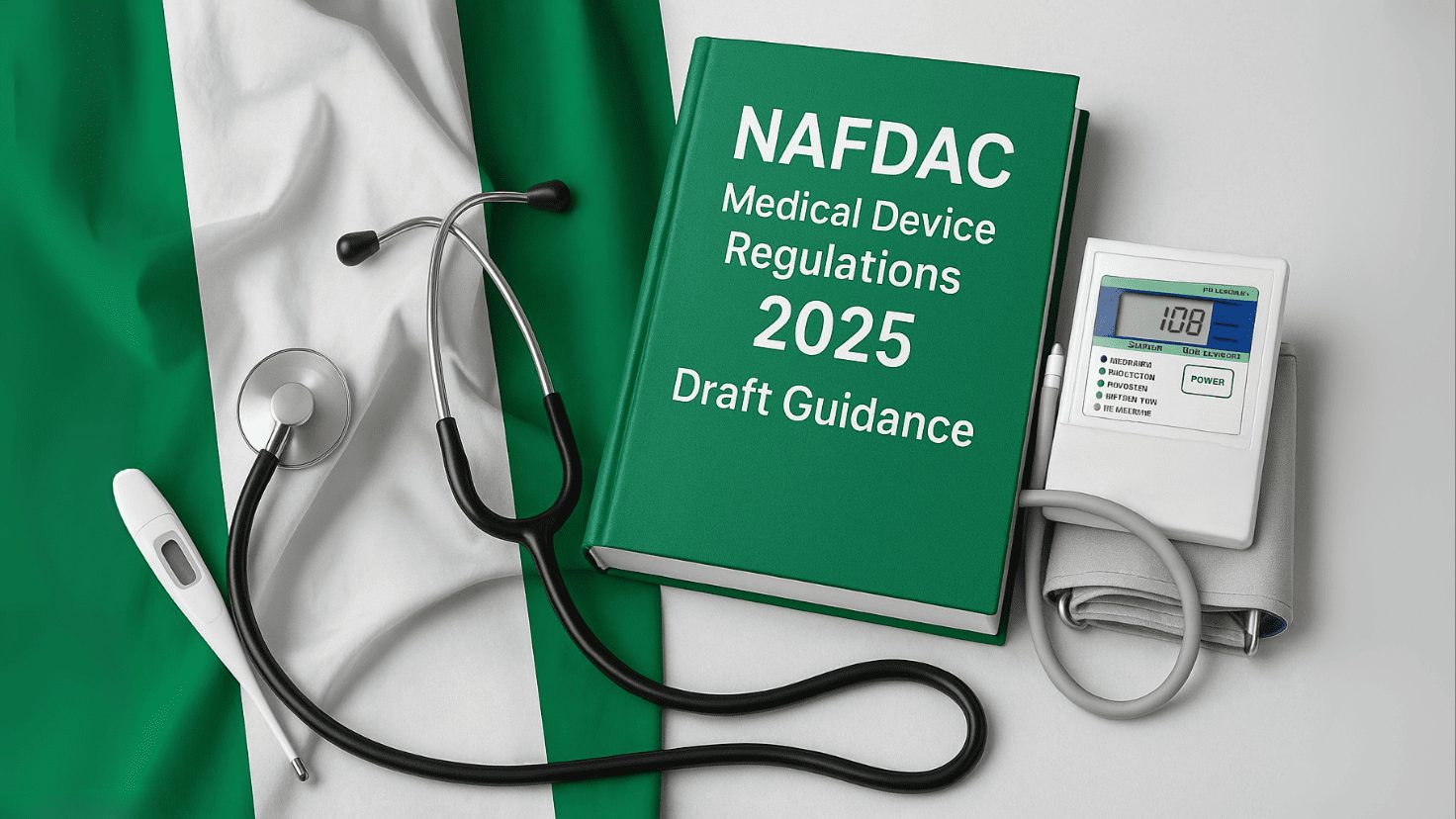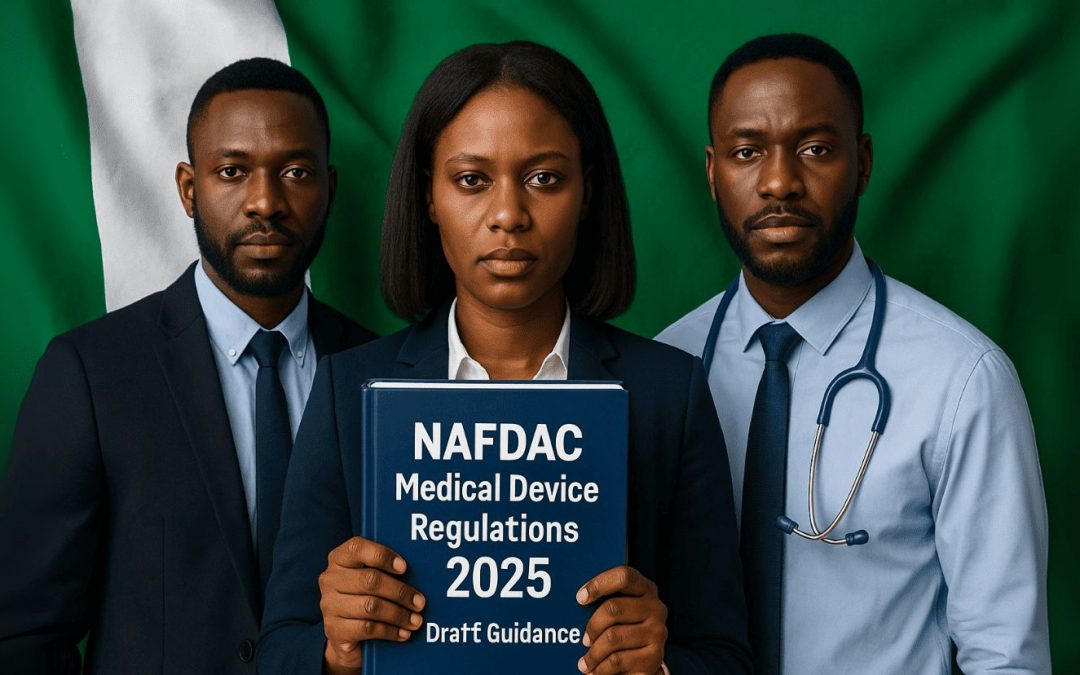On July 23, 2025, Nigeria’s National Agency for Food and Drug Administration and Control (NAFDAC) published a draft regulation that, once finalized, will reshape the country’s medical device and in-vitro diagnostic (IVD) landscape

Table of content
On July 23, 2025, Nigeria’s National Agency for Food and Drug Administration and Control (NAFDAC) published a draft regulation that, once finalized, will reshape the country’s medical device and in-vitro diagnostic (IVD) landscape. The regulation establishes a comprehensive legal and regulatory framework for all classes of medical devices and related products representing a pivotal step in aligning Nigeria’s regulatory infrastructure with global best practices.
The draft, titled the “NAFDAC Medical Devices, Including In-Vitro Diagnostics and Related Products Regulations, 2025,” is now open for public comment through September 20, 2025. For regulatory professionals and manufacturers already in or considering entry into the Nigerian market, this is a critical opportunity to help shape the final version of the regulation while preparing for its future implementation.
A Long-Awaited Framework for a Fast-Growing Market
Nigeria’s medical device sector has long operated without a cohesive, transparent regulatory structure, particularly in comparison to other major markets. As a result, companies navigating the Nigerian system have often faced challenges related to unclear requirements, inconsistent oversight, and limited postmarket enforcement.
This draft regulation marks a significant departure from that reality. NAFDAC’s goal is to introduce a modern, risk-based framework that improves product oversight, ensures patient safety, and provides regulatory predictability to manufacturers and distributors.
The new regulation will apply to both imported and locally manufactured products, reinforcing a uniform standard of quality and compliance across the entire supply chain. Crucially, the regulation aims to strengthen public health protections while fostering an environment that encourages innovation and investment in Nigeria’s healthcare sector.
By aligning with widely accepted international frameworks such as ISO standards and the classification principles of the International Medical Device Regulators Forum (IMDRF), NAFDAC is positioning Nigeria as a more accessible, strategically relevant MedTech market.

Objectives of the Regulation
The stated objectives of the draft regulation are ambitious yet pragmatic. NAFDAC intends to establish a structured and transparent regulatory system that supports both oversight and access.
The agency seeks to ensure that all medical devices and IVDs sold in Nigeria are safe, effective, and manufactured to consistent quality standards. This applies not only to complex surgical or diagnostic technologies but also to lower-risk devices and related accessories.
Another central objective is to provide a clear, traceable path to market authorization. This will be particularly beneficial for global companies seeking to enter or expand in Nigeria.
Instead of navigating opaque or inconsistent processes, manufacturers will be able to follow a standardized set of requirements, documentation expectations, and review timelines. Finally, the regulation aims to align Nigeria’s approach with global regulatory practices, helping manufacturers streamline their compliance strategies across markets and reducing the friction often associated with entry into emerging regions.
What’s Covered Under the New Framework
The scope of the regulation is intentionally broad, covering virtually every category of medical device and related product.
According to the draft, the regulation applies to:
- All classes of medical devices, ranging from low-risk consumables to high-risk therapeutic equipment
- In-vitro diagnostic devices (IVDs), including reagents, test kits, and instruments
- Accessories and products used in conjunction with medical devices
- Products that are either manufactured in Nigeria or imported into the country for distribution or sale
By encompassing such a wide range of product types and risk levels, the regulation creates a unified framework designed to reduce regulatory gaps and improve market transparency. Importantly, the requirements outlined in the draft will apply equally to global and local manufacturers, underscoring NAFDAC’s focus on equity, safety, and accountability throughout the device lifecycle.
Inside the Draft: Key Regulatory Features
At the core of the regulation is a risk-based classification system, which categorizes devices into Classes A through D, based on potential risk to the patient or user. Class A represents the lowest-risk devices, while Class D includes products with the highest risk profile.
This system mirrors frameworks used in the EU, U.S., Canada, and Australia, providing a level of familiarity for global regulatory teams. Before any device can be marketed in Nigeria, it must undergo a formal registration process with NAFDAC.
This includes the submission of a comprehensive technical file detailing the product’s design, labeling, performance, safety, and quality systems. Manufacturers must demonstrate that they have implemented a recognized Quality Management System (QMS), such as ISO 13485 which NAFDAC will evaluate as part of the registration review.
The regulation also places significant emphasis on conformity assessment, which involves a technical and safety evaluation of each device based on its classification and intended use. Devices will be required to meet defined performance and labeling standards and may be subject to clinical evaluation or supporting data requirements, particularly for higher-risk classes.
A notable strength of the draft is its focus on postmarket surveillance. Once a product is approved and in use, manufacturers will be expected to monitor for adverse events and product complaints and to submit corrective or preventive actions when necessary.
NAFDAC reserves the right to conduct inspections of manufacturing and distribution sites, whether based in Nigeria or abroad, to verify continued compliance. To ensure enforcement, the regulation outlines penalties for non-compliance including license suspension, revocation, or financial sanctions.
This gives the agency the tools it needs to uphold the integrity of the system while protecting public health.
Public Consultation Open Through September 20
While the regulation introduces significant change, NAFDAC is committed to ensuring that it reflects the needs and realities of the MedTech industry. That’s why the agency is currently welcoming feedback from manufacturers, importers, healthcare providers, and other stakeholders.
The public comment period, which runs through September 20, 2025, is a critical opportunity for industry voices to engage. Stakeholders are encouraged to review the full draft regulation, identify potential concerns or ambiguities, and submit detailed comments that will inform the final version.
Participating in this process not only supports regulatory clarity but also allows companies to stay ahead of future requirements and ensure their internal systems are prepared for a smooth transition.
What This Means for Global Regulatory Teams
Nigeria is rapidly emerging as a key healthcare market in Africa, and a well-structured regulatory framework is foundational to sustainable growth. For regulatory teams operating in multiple geographies, this draft regulation offers both a challenge and an opportunity.
On one hand, it introduces new requirements that must be monitored and built into existing workflows. On the other, it creates a clearer, more predictable environment for long-term product planning and market access.
If implemented effectively, the regulation could reduce approval timelines, strengthen oversight, and support faster, safer access to medical technology. Companies that act now by reviewing the draft, preparing internal documentation, and submitting comments will be better positioned for success once the regulation is finalized.
Those that wait may face delays or compliance gaps when the rules go into force.
How Can RegDesk Help?
Regulatory change is inevitable. The real differentiator is how you respond.
At RegDesk, we help MedTech companies anticipate and adapt to evolving regulatory landscapes, like Nigeria’s, with speed and confidence.
Our platform offers:
- Real-time regulatory intelligence to monitor updates and guidance
- Centralized document management for submissions and postmarket activities
- Country-specific insights to align your strategy with local requirements
- Automated workflows to manage product changes, renewals, and compliance documentation
Whether you’re expanding into new markets or optimizing existing ones, RegDesk helps your team stay ahead, so compliance becomes a competitive advantage, not an obstacle. Want to get ahead of Nigeria’s regulatory transformation?

